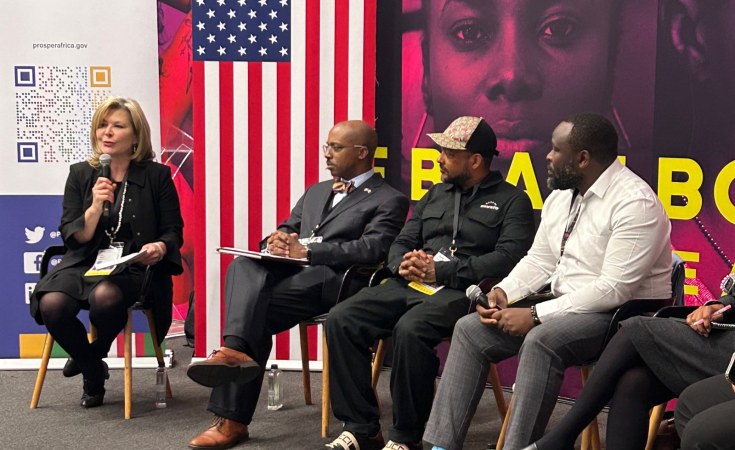In recognition of the potential of Africa’s creative industries, Prosper Africa strives to harness these sectors for job creation and sustainable development.
Prosper Africa’s initiative aimed at increasing trade and investment between the United States and African nations, is promoting creative sectors as drivers of economic growth. The U.S. government’s Prosper Africa is participating in FAME Week Africa, a premier pan-African celebration of arts, film, television, animation, music, fashion, and media in Cape Town, South Africa.
It is estimated that the U.S. contributes $660 billion to the global $2 trillion media and entertainment market, making it one of the world’s leading exporters of creative goods and services. Streaming services such as Netflix and Amazon Video have already established significant interactions between the U.S. creative sector and African creators, with Netflix leading the pack with over two million subscribers, and Disney Studios and Amazon Video partnering with African creators to finance and produce content, reports Prosper Africa.
Through FAME, the U.S. delegation will connect U.S. and international film distributors with African producers and distributors.
“Prosper Africa is a groundbreaking U.S. presidential initiative to scale two-way trade and investment on a transformative basis to strengthen the economic and strategic partnership between the U.S. and African countries,” said Lisa M. Walker, Managing Director of Africa Operations for Prosper Africa.
“We have a number of priority sectors, but creative is one of them, and it’s one for several reasons,” she said. “We see really strong cultural ties that we want to build on, but it’s for the job creation potential, especially for young people.”
“We view the creative sector as a key area where we can upskill talent and generate future-oriented jobs. I believe the youth of Africa will be at the forefront of developing new job opportunities – many of which we can’t even envision yet. We aim to shift the narrative between the U.S. and Africa, particularly in how Africa is perceived in the U.S.”
Walker said “One of our key roles is to attract investment from the U.S., including high-net-worth individuals, pension funds, family offices, and venture capital. We’ve identified a gap where there’s an exaggerated sense of risk and a lack of understanding about African markets. To mitigate this, we need to enhance the narrative around Africa, showcasing it as a land of opportunity, innovation, and entrepreneurship. People must see the continent as it truly is – a vibrant hub of progress and potential.”
What’s Next? Atlanta’s Future in U.S.-South Africa Relations
“Prosper Africa is a continental initiative that spans both sub-Saharan Africa and North Africa, reaching up to Egypt and Morocco,” said Walker.
“Our long-term vision is to foster a truly mutual partnership. As U.S. Ambassador to South Africa, Reuben E. Brigety II often puts it, we aim for U.S. companies and individuals to offer genuine value to African partners and businesses. We’re committed to providing transparent capital that supports long-term sustainability and partnerships based on mutual benefit. This means prioritizing labor, job creation, the environment, and climate issues.”
The Atlanta Phambili project, which means “forward” in Zulu and Xhosa, aims to deepen bilateral ties between the U.S. and South Africa through the City of Atlanta’s educational and research institutions, Diaspora connections, creative industries, and economic dynamism.
In terms of securing funding, Prosper Africa’s creative strategy focuses on strengthening the financial ecosystem for Africa’s creative industries. “We’re working to make creative entrepreneurs more bankable, offering the business expertise they need to thrive, and replicating successful banking products from the U.S., like those from J.P. Morgan and Citi, which are tailored for the film sector. Our goal is to become the partner that African countries, entrepreneurs, and creatives actively seek out and wish to collaborate with,” she said.
“They have dedicated film units in the U.S., and we’d love to see similar structures established here in Africa,” Walker said. “We aim to facilitate matchmaking between investors focused on social impact and creatives on the continent. Our goal is to bridge the gap and connect those who want to invest with the vibrant creative community in Africa.”
“Our initiatives span across various countries, not just South Africa. We have strong connections with Kenya, exemplified by President William Ruto’s recent visit to Atlanta, where he toured Tyler Perry Studios. Kenya, South Africa, and Nigeria are key partners. Nigeria, with its Nollywood industry, is particularly significant. The U.S. Department of State has active programs there to accelerate talent and link creatives with universities that supply Hollywood with skilled professionals,” said Walker.
Ruto said that the Tyler Perry studio tour inspired him to channel additional resources into Kenya’s creative economy. Ruto noted the importance of investing in the creative sector and highlighted the possibilities for collaboration between Kenya and leading international creative industries, providing greater opportunities for Kenyans.
Walker also said that they’re also exploring opportunities in countries like Mauritius, which has a growing film sector, and Morocco, known for its thriving movie industry. “Our goal is to replicate successful incentives and partnerships across these regions,” she said.
“While the outcomes are still in development, I’m seeing promising signs from content creators and producers who are close to finalizing deals. Our strength lies in convening and matchmaking, alongside attracting capital and developing impactful programs. One crucial takeaway is the importance of training. Unlike other sectors where training may not lead to employment, the creative industry’s high demand ensures that trained individuals will likely be quickly absorbed into the workforce.”
However, Walker said one of the key challenges is data.
“Creatives often struggle to build a history and balance sheet that banks can easily interpret,” she said. “In other parts of Africa, Prosper Africa has worked on establishing credit and bankability through various proxy measures, such as contracts with distributors and completion contracts, as well as ensuring the presence of insurance products. This approach helps address both the information and financing gaps.”
“I believe the creative sector holds immense potential for driving change and engagement. It’s deeply cultural and personal, and it captures people’s imagination. By harnessing storytelling, music, and fashion, the creative sector can influence views and behaviors, making it a powerful channel for transformation,” said Walker.



